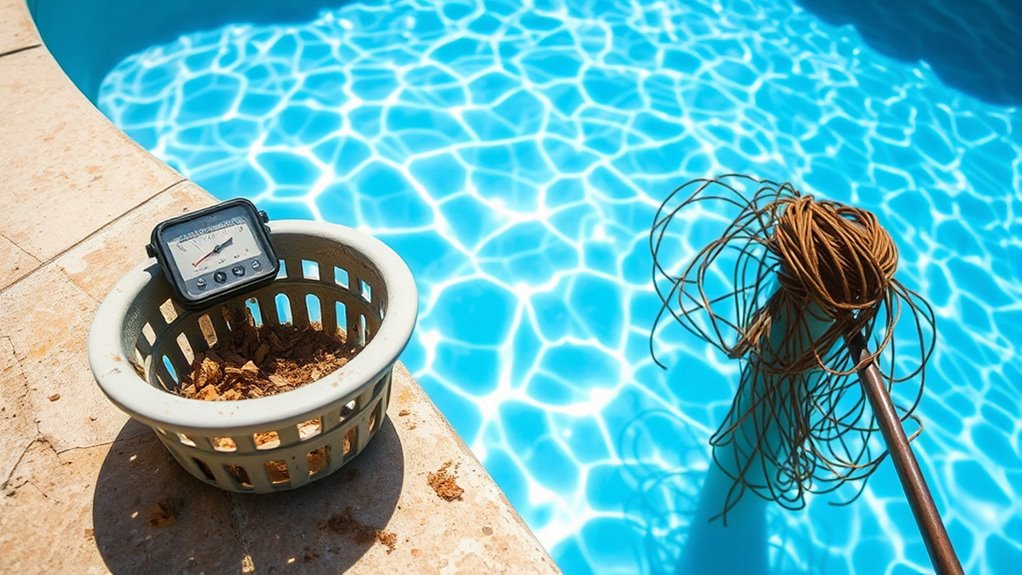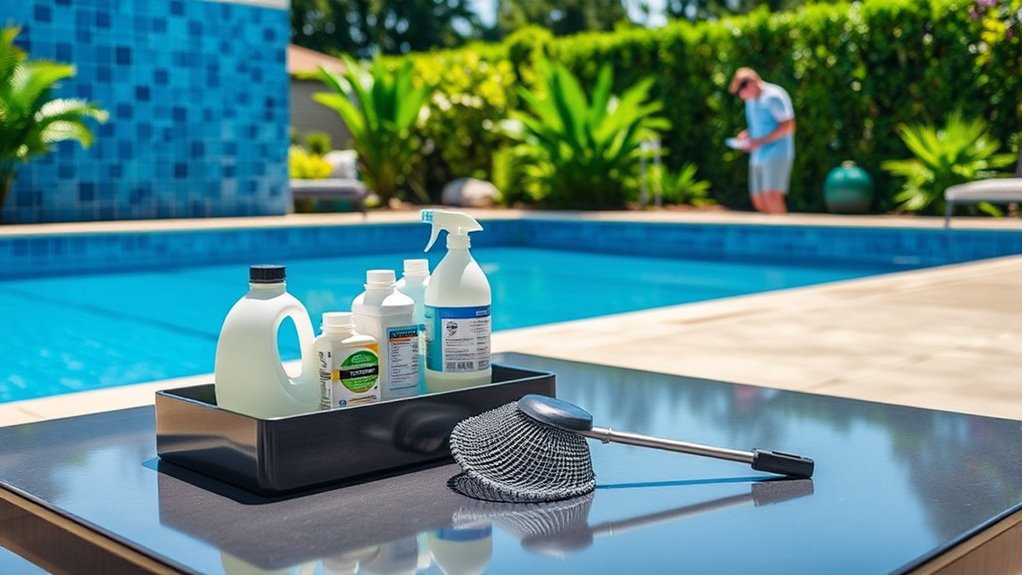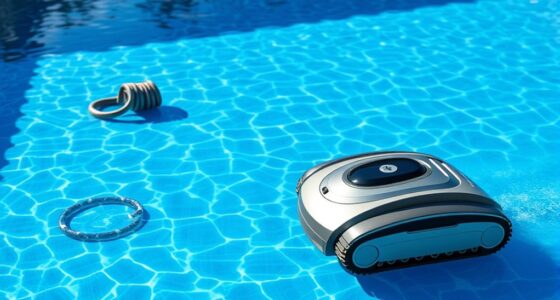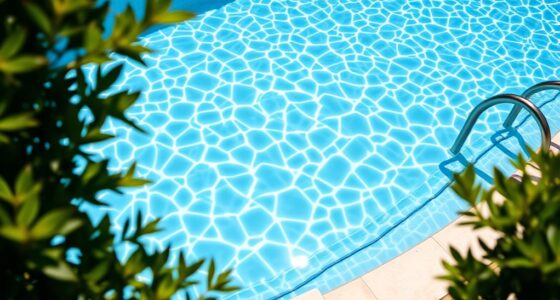Avoid these common pool maintenance mistakes by regularly testing your water’s chemistry, cleaning filters, and inspecting equipment. Don’t neglect proper circulation or forget routine chores like skimming and brushing. Skipping these steps leads to cloudy water, algae growth, and costly repairs. By staying consistent with simple tasks and maintenance, you can keep your pool clean, safe, and inviting. Keep going, and you’ll discover how to prevent these issues before they happen.
Key Takeaways
- Regularly test and balance water chemistry to prevent cloudiness, algae, and equipment corrosion.
- Maintain equipment by cleaning filters and inspecting pumps to avoid costly repairs and ensure efficient operation.
- Run the pool pump for the recommended duration to ensure proper circulation and prevent stagnant water.
- Perform routine cleaning tasks like skimming and brushing to prevent debris buildup and water quality issues.
- Keep filters clean and well-maintained to ensure effective filtration and extend equipment lifespan.

Maintaining a pool can be straightforward, but common mistakes can quickly turn it into a costly headache. One of the most frequent errors homeowners make is neglecting to monitor and correct chemical imbalances. When you skip testing your water regularly, you risk allowing pH levels, alkalinity, and sanitizer levels to drift out of balance. This imbalance can lead to cloudy water, algae growth, and even corrosion of your pool’s equipment. It’s tempting to assume that adding chemicals once in a while is enough, but consistent testing and adjustment are vital to keep your pool safe and inviting. Using test strips or a digital tester weekly helps you catch issues early before they escalate, saving you both time and money.
Regular testing and balancing chemicals prevent costly pool issues and keep your water crystal clear.
Another common mistake is equipment neglect. Pool equipment—such as pumps, filters, and heaters—requires regular maintenance to function efficiently. If you ignore routine inspections or forget to clean your filters, debris can build up, reducing water circulation and filtration. Poor circulation not only affects water clarity but also allows chemical imbalances to develop more rapidly. Over time, equipment can wear out or break down prematurely if neglected, leading to costly repairs or replacements. Set a schedule to clean filters, check for leaks, and ensure your pump is operating correctly. Regular maintenance keeps your system running smoothly and extends the lifespan of your equipment.
Many pool owners also underestimate the importance of proper circulation. Even if your chemicals are balanced, stagnant water can promote algae growth and bacteria buildup. To prevent this, run your pool pump for the recommended duration each day, especially during warmer months. Proper circulation distributes chemicals evenly and prevents dead spots where algae can take hold. Failing to do this can force you into more aggressive chemical treatments later, which are more expensive and less environmentally friendly.
Additionally, overlooking routine maintenance tasks like skimming debris, brushing the walls, and emptying skimmer baskets can contribute to bigger problems down the line. Debris and algae not only make your pool look unappealing but can also clog your filtration system, forcing it to work harder and consume more energy. By staying proactive with these simple chores, you avoid costly repairs and maintain a sparkling, healthy pool.
Incorporating filter maintenance into your routine is crucial, as neglected filters can significantly impact water quality and system longevity. In the end, avoiding these common mistakes boils down to consistency and awareness. Regular testing, attentive equipment care, and proper circulation are your best tools to keep your pool in top condition. When you commit to these best practices, you’ll enjoy a clean, safe, and inviting pool season after season, without the stress and expense of neglect.
Frequently Asked Questions
How Often Should I Test My Pool Water Chemistry?
You should test your pool water chemistry at least twice a week to guarantee the chemical balance stays in check. Regular testing frequency helps you catch imbalances early, preventing problems like algae growth or cloudy water. Use reliable test kits to check chlorine, pH, and alkalinity levels. Maintaining proper chemical balance keeps your pool safe, clean, and inviting, so make testing a regular part of your pool maintenance routine.
What Are Signs of Algae Growth in My Pool?
Did you know that algae can start growing within 24 hours if water isn’t properly maintained? Watch for pool algae indicators like a green, cloudy, or slimy surface. Algae prevention tips include maintaining proper chlorine levels and regular brushing. If you notice these signs early, you can prevent a full-blown algae bloom and keep your pool clean and safe for swimming. Stay vigilant to catch algae growth early!
How Do I Choose the Right Pool Cleaning Tools?
To select the appropriate pool cleaning tools, consider your pool size and type. You’ll want a skimmer for quick pool skimming and removing debris efficiently. Get a brush suited for your pool surface to help with chemical balancing by scrubbing algae or dirt. A telescopic pole makes cleaning easier and more thorough. Investing in quality tools guarantees you maintain clear, healthy water with less effort and fewer mistakes.
When Should I Drain and Refill My Pool?
Imagine your pool’s like a vintage record—sometimes, it needs a fresh spin. You should drain and refill your pool when water becomes cloudy, unbalanced, or after heavy storms, typically every 3-5 years. Proper pool draining and water refilling help maintain water quality and extend equipment life. Keep an eye on chemical levels and clarity, and don’t hesitate to drain if the water’s past its prime.
What Safety Precautions Are Essential During Pool Maintenance?
During pool maintenance, you need to prioritize pool safety by keeping the area clear of hazards and ensuring proper chemical handling. Wear protective gear like gloves and goggles when handling chemicals, and always follow instructions carefully. Keep chemicals stored safely away from children and pets. Ventilate the area well to avoid inhaling fumes. Regularly check equipment for safety issues to prevent accidents, ensuring a safe environment for everyone around your pool.
Conclusion
By avoiding these common pool maintenance mistakes, you can keep your pool crystal clear and inviting. Think of your pool like a delicate garden—if you neglect it, weeds and pests take over quickly. Regular testing, cleaning, and proper chemical balance are your best tools to prevent problems. Stay vigilant and proactive, and your pool will be the perfect oasis for you and your family—like a sparkling gem shining in the sun.










